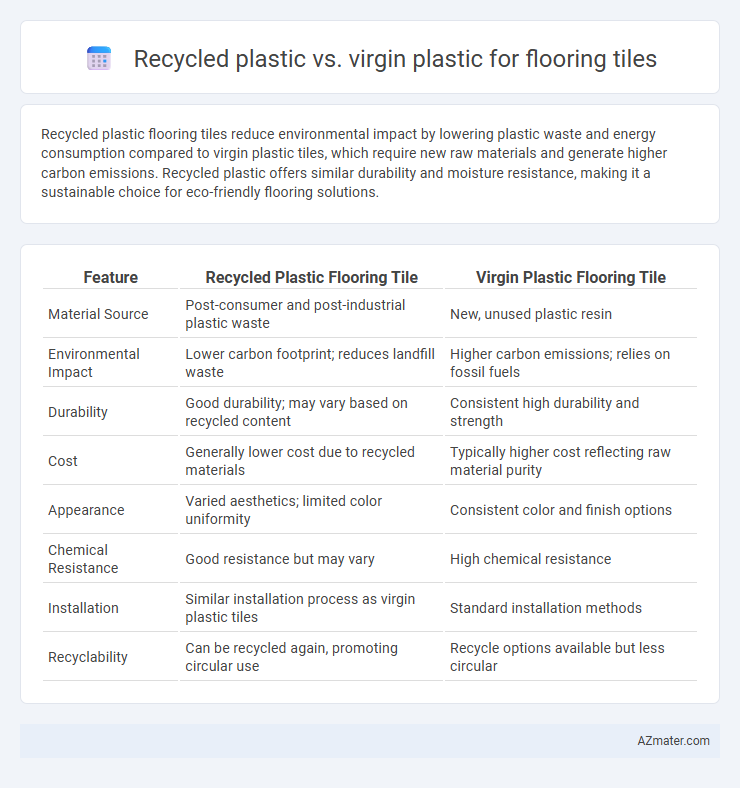Recycled plastic flooring tiles reduce environmental impact by lowering plastic waste and energy consumption compared to virgin plastic tiles, which require new raw materials and generate higher carbon emissions. Recycled plastic offers similar durability and moisture resistance, making it a sustainable choice for eco-friendly flooring solutions.
Table of Comparison
| Feature | Recycled Plastic Flooring Tile | Virgin Plastic Flooring Tile |
|---|---|---|
| Material Source | Post-consumer and post-industrial plastic waste | New, unused plastic resin |
| Environmental Impact | Lower carbon footprint; reduces landfill waste | Higher carbon emissions; relies on fossil fuels |
| Durability | Good durability; may vary based on recycled content | Consistent high durability and strength |
| Cost | Generally lower cost due to recycled materials | Typically higher cost reflecting raw material purity |
| Appearance | Varied aesthetics; limited color uniformity | Consistent color and finish options |
| Chemical Resistance | Good resistance but may vary | High chemical resistance |
| Installation | Similar installation process as virgin plastic tiles | Standard installation methods |
| Recyclability | Can be recycled again, promoting circular use | Recycle options available but less circular |
Introduction to Plastic Flooring Tiles
Plastic flooring tiles offer versatile, durable solutions for residential and commercial spaces. Recycled plastic flooring tiles utilize post-consumer and post-industrial waste, reducing environmental impact and conserving resources compared to virgin plastic tiles made from new petrochemical materials. Advances in manufacturing technology enable recycled plastic tiles to match the strength, aesthetics, and longevity of virgin plastic alternatives while supporting sustainability initiatives.
What is Recycled Plastic Flooring?
Recycled plastic flooring tiles are made from post-consumer or post-industrial plastic waste that is processed and repurposed into durable, eco-friendly flooring materials. These tiles reduce environmental impact by diverting plastic from landfills and oceans, offering a sustainable alternative to virgin plastic tiles manufactured from new, petroleum-based polymers. Recycled plastic flooring provides similar strength, water resistance, and versatility as virgin plastic tiles while promoting circular economy principles and reducing carbon footprint.
Understanding Virgin Plastic Flooring
Virgin plastic flooring tiles are manufactured using pure, unprocessed plastic resin, ensuring consistent quality, durability, and resistance to wear and tear. These tiles typically offer superior mechanical strength and a uniform appearance compared to recycled plastic alternatives, making them suitable for high-traffic areas requiring long-lasting performance. While virgin plastic flooring delivers enhanced stability and chemical resistance, it often comes at a higher environmental and cost footprint due to the extraction and processing of new raw materials.
Manufacturing Process Comparison
Recycled plastic flooring tiles are produced by melting down post-consumer or post-industrial plastic waste, reducing the need for raw petroleum extraction and lowering overall carbon emissions compared to virgin plastic tiles. Virgin plastic tiles require the polymerization of fresh petrochemical resins, involving energy-intensive processes like cracking and refining, which contribute significantly to environmental pollution. The manufacturing of recycled tiles often incorporates advanced sorting and cleaning techniques to ensure material purity and performance consistency, while virgin plastic production depends heavily on non-renewable resource extraction and higher energy consumption.
Environmental Impact: Recycled vs Virgin Plastic
Recycled plastic flooring tiles significantly reduce environmental impact by diverting waste from landfills and lowering carbon emissions compared to virgin plastic, which requires new petroleum extraction and intensive energy consumption. The use of recycled materials decreases the demand for fossil fuels and minimizes ecological disruption linked to plastic production. Choosing recycled plastic tiles promotes sustainability by contributing to a circular economy and reducing overall greenhouse gas emissions.
Durability and Performance in Flooring
Recycled plastic flooring tiles demonstrate comparable durability to virgin plastic tiles, exhibiting strong resistance to impact, moisture, and wear, making them suitable for high-traffic areas. Virgin plastic tiles, often made from polyethylene or polypropylene, provide consistent performance with enhanced strength and flexibility due to their pure material composition. Both options offer excellent resistance to cracking and deformation, but recycled plastic tiles contribute to sustainability by reducing environmental impact without compromising long-term flooring performance.
Cost Analysis: Recycled vs Virgin Plastic Tiles
Recycled plastic flooring tiles typically cost 20-40% less than virgin plastic tiles due to lower raw material expenses and reduced manufacturing energy requirements. Virgin plastic tiles offer consistent quality but come with higher production costs linked to petrochemical sourcing and processing. Long-term savings with recycled tiles arise from diminished environmental impact fees and potential subsidies promoting sustainable materials.
Design and Aesthetic Options
Recycled plastic flooring tiles offer versatile design options with unique textures and color variations derived from reclaimed materials, creating environmentally conscious aesthetics. Virgin plastic tiles provide consistent, uniform finishes and a broader palette of vibrant colors, enabling precise, high-end design customization. Both options accommodate modern trends, but recycled plastics emphasize eco-friendly visuals, while virgin plastics excel in exact design replication and smooth surface finishes.
Health and Safety Considerations
Recycled plastic flooring tiles reduce environmental impact by minimizing waste but may contain contaminants affecting indoor air quality if not properly processed. Virgin plastic tiles, manufactured under controlled conditions, typically offer consistent chemical composition and lower emissions of volatile organic compounds (VOCs), promoting better indoor health safety. Selecting flooring materials with certifications like GREENGUARD ensures compliance with health and safety standards, mitigating risks associated with harmful substances.
Choosing the Right Plastic Flooring for Your Needs
Recycled plastic flooring tiles offer sustainability benefits by reducing landfill waste and energy consumption compared to virgin plastic, which provides superior durability and consistent quality due to its pure raw material composition. Selecting the right plastic flooring depends on balancing environmental impact with performance requirements, where high-traffic areas may benefit from virgin plastic's strength and moisture resistance, while low-impact zones are ideal for recycled options. Consider factors like load-bearing capacity, exposure to chemicals, and maintenance frequency to optimize long-term cost and ecological advantages.

Infographic: Recycled plastic vs Virgin plastic for Flooring tile
 azmater.com
azmater.com